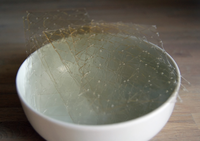
Photo from wikipedia
In this study, bortezomib (BTZ, a cytotoxic water-insoluble anticancer drug) was encapsulated in micellar nanoparticles having a catechol-functionalized polycarbonate core through a pH-sensitive covalent bond between phenylboronic acid (PBA) in… Click to show full abstract
In this study, bortezomib (BTZ, a cytotoxic water-insoluble anticancer drug) was encapsulated in micellar nanoparticles having a catechol-functionalized polycarbonate core through a pH-sensitive covalent bond between phenylboronic acid (PBA) in BTZ and catechol, and these drug-loaded micelles were incorporated into hydrogels to form micelle/hydrogel composites. A series of injectable, biodegradable hydrogels with readily tunable mechanical properties were formed and optimized for sustained delivery of the BTZ-loaded micelles through ionic coacervation between PBA-functionalized polycarbonate/poly(ethylene glycol) (PEG) "ABA" triblock copolymer and a cationic one having guanidinium- or thiouronium-functionalized polycarbonate as "A" block. An in vitro release study showed the pH dependence in BTZ release. At pH 7.4, the BTZ release from the micelle/hydrogel composite remained low at 7%, whereas in an acidic environment, ∼85% of BTZ was released gradually over 9 days. In vivo studies performed in a multiple myeloma MM.1S xenograft mouse model showed that the tumor progression of mice treated with BTZ-loaded micelle solution was similar to that of the control group, whereas those treated with the BTZ-loaded micelle/hydrogel composite resulted in significant delay in the tumor progression. The results demonstrate that this hydrogel has great potential for use in subcutaneous and sustained delivery of drug-loaded micelles with superior therapeutic efficacy.
Journal Title: ACS applied materials & interfaces
Year Published: 2018
Link to full text (if available)
Share on Social Media: Sign Up to like & get
recommendations!